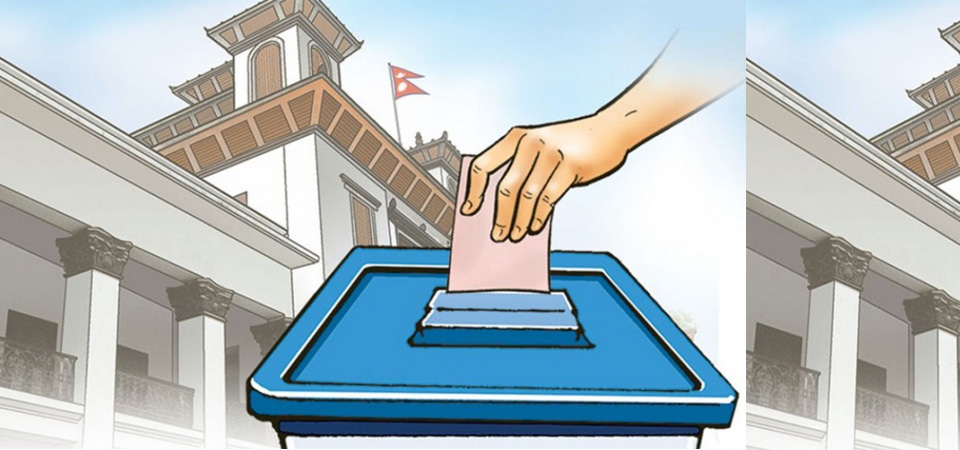‘Political willpower, not elections, ensures stability’

By Modnath Dhakal
Kathmandu, Jan. 20: Former chief election commissioners and experts have said that elections alone do not ensure stability of the government and good governance.
They cited lack of political willpower and confidence for the inability of any government to complete a full term of five years in Nepal.
"Stability and good governance are not related to the electoral systems," former chairman of the Nepal Law Commission Madhav Poudel said at an interaction on 'Reforms in electoral system and management' organised virtually by the Policy Research Institute on Wednesday.
He cited examples from the neighbourhood and elsewhere to illustrate that the coalition governments have performed well there. "Look at India, the Manmohan Singh-led government was a coalition government, but it completed five years. Likewise, the first government led by Narendra Modi was also backed by an alliance and it served the full tenure," he said.
Poudel also stated that Nepali political leaders' have the convictions that the House of Representatives (HoR) could be dissolved at any time on their whim.
Khimlal Devkota, a lawmaker, said that a pre-poll coalition is better than the post-poll alliance as the latter is primarily driven with the objective of reaching the power, staying there and, sometimes exploiting national resources for party and individual benefits. On the contrast, pre-election coalition can contribute to the political stability, he maintained.
However, political analyst Tula Narayan Shah opposed the idea and said that the pre-election coalition also couldn't contribute to the political stability in case of Nepal. “See the latest example of the pre-election coalition between the CPN-UML and CPN-MC,” he said.
The two parties had made an election alliance and later merged into one but their government failed to complete its full term, instead the party is now fragmented into three with the erstwhile CPN-UML's former general secretary Madhav Nepal forming a new political party – CPN (Unified Socialists).
Dolakh Bahadur Gurung, former Chief Election Commissioner (CEC), said that while the elections are getting more expensive, they are not helping a political party to get majority in the parliament.
He expressed concerns over the right representation, and said that most of the political parties are not serious about the inclusive representations.
He suggested reforms in current election system with an overhaul in the proportional representative structure.
Elections do not help inclusion
Shyam Shrestha, another political analyst, said that the present electoral system cannot ensure political stability and fair representation of women. Despite inclusion policy, only 18 chairperson or mayors are elected in 753 local bodies and 62 ward chairs in 6473 wards across the country.
He said that present electoral system cannot ensure the fair representation of women, Dalits and Muslims so there should be a mandatory inclusive policy for the direct (first-past-the-post) elections.
According to Shrestha, elections have become highly expensive. Only the rich, elites and corrupt people can contest elections. The experts also said that the proportional representation has been a hostage of nepotism in all political parties.
Reforms are needed
Dr. Ayodhi Prasad Yadav, former CEC, said that that the current system is historic and better system compared to other countries. It fits the political situation and economic condition.
However, he suggested some reforms in the electoral system, and maintained that most of the malpractices and corruptions are not the product of elections rather of the mentality of the political leaders.
Pradip Pokharel, chairman of the Election Observation Committee Nepal, said that the businesses that want to twist national policies according to their requirement fund candidates that are ready to dance to their tunes.
"Hence, candidates from middle and lower middle class having less influence do not dare to contest the elections," he said.
Nahakul KC, Chief Executive Officer of the Institute for International Development (IID), said that the proportional election system should be redefined or restructured and it must not remain for an indefinite period.
"Inclusion policy should be based on economic and geographical definitions not only on ethnicity and caste," he said.
The experts also suggested running periodic capacity building programmes for the representatives of the local bodies and reducing proportional representation size to 10-15 per cent in the House of Representatives.
Recent News

Do not make expressions casting dout on election: EC
14 Apr, 2022
CM Bhatta says may New Year 2079 BS inspire positive thinking
14 Apr, 2022
Three new cases, 44 recoveries in 24 hours
14 Apr, 2022
689 climbers of 84 teams so far acquire permits for climbing various peaks this spring season
14 Apr, 2022
How the rising cost of living crisis is impacting Nepal
14 Apr, 2022
US military confirms an interstellar meteor collided with Earth
14 Apr, 2022
Valneva Covid vaccine approved for use in UK
14 Apr, 2022
Chair Prachanda highlights need of unity among Maoist, Communist forces
14 Apr, 2022
Ranbir Kapoor and Alia Bhatt: Bollywood toasts star couple on wedding
14 Apr, 2022
President Bhandari confers decorations (Photo Feature)
14 Apr, 2022











